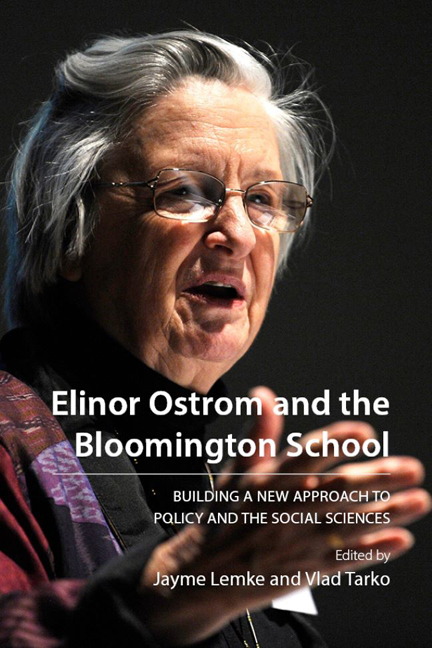Book contents
- Frontmatter
- Contents
- Acknowledgements
- Contributors
- 1 Introduction: the Bloomington school in context
- 2 Public choice theory: reuniting Virginia and Bloomington
- 3 New institutional economics: building from shared foundations
- 4 Elinor Ostrom as behavioral economist
- 5 New economic sociology and the Ostroms: a combined approach
- 6 Foundations of social order: the Ostroms and John Searle
- 7 Environmental policy from a self-governance perspective
- 8 Learning from the socialist calculation debate: is efficiency in public economics possible?
- 9 Public administration from “intellectual crisis” to contemporary “governance theory”
- 10 Rethinking federalism: social order through evolution or design?
- References
- Index
8 - Learning from the socialist calculation debate: is efficiency in public economics possible?
Published online by Cambridge University Press: 21 December 2023
- Frontmatter
- Contents
- Acknowledgements
- Contributors
- 1 Introduction: the Bloomington school in context
- 2 Public choice theory: reuniting Virginia and Bloomington
- 3 New institutional economics: building from shared foundations
- 4 Elinor Ostrom as behavioral economist
- 5 New economic sociology and the Ostroms: a combined approach
- 6 Foundations of social order: the Ostroms and John Searle
- 7 Environmental policy from a self-governance perspective
- 8 Learning from the socialist calculation debate: is efficiency in public economics possible?
- 9 Public administration from “intellectual crisis” to contemporary “governance theory”
- 10 Rethinking federalism: social order through evolution or design?
- References
- Index
Summary
Vincent Ostrom's The Meaning of Democracy and the Vulnerability of Democracies (1997) is in many ways his scholarly manifesto, and as such provides a window into his world view and the scholarly task he set for himself throughout his career. Critical to his effort was a quest to understand the human condition, and in particular the conditions that would make possible a self-governing democratic society. Democracy for Ostrom was not primarily about the mechanisms of political selection, that would no doubt be part of the machinery that would be analyzed, but about ways of relating to one another as free, equal, and dignified individuals. Citizens in a democratic society would need to shoulder the burden of the “cares of thinking” and the “troubles of living”, as Tocqueville put it, in order to be capable of self-governance. But institutions of governance must also be structured in such a manner that they exhibit neither dominance, nor acts discriminatory. “Democratic ways of life,” Ostrom tells us at the very beginning of his book, “turn on self-organizing and self-governing capabilities rather than presuming that something called ‘the Government’ governs” (1997: 3–4). Democratic societies are at risk, Ostrom states clearly, when relationships are grounded on the “principles of command and control rather than on principles of self-responsibility in self-governing communities of relationships” (ibid.: 4).
It is often forgotten in the aftermath of Elinor Ostrom's Nobel Prize, how their respective projects shared this fundamental commitment to the exploration of self-governing democratic society. They embarked from the mid-1960s onward on their “long polycentric journey” as she put it on more than one occasion. This included not just the more philosophical explorations of Vincent's meaning of democracy, and the relationship between political theory and policy analysis, but the nuts and bolts of institutional arrangements that made self-governance possible even in the face of difficult initial conditions. This was most famously seen in the acts of public entrepreneurship associated with managing common-pool resources, but it was also evident in the local provision of public goods such as roads, police, schools, etc.
- Type
- Chapter
- Information
- Elinor Ostrom and the Bloomington SchoolBuilding a New Approach to Policy and the Social Sciences, pp. 123 - 136Publisher: Agenda PublishingPrint publication year: 2021



